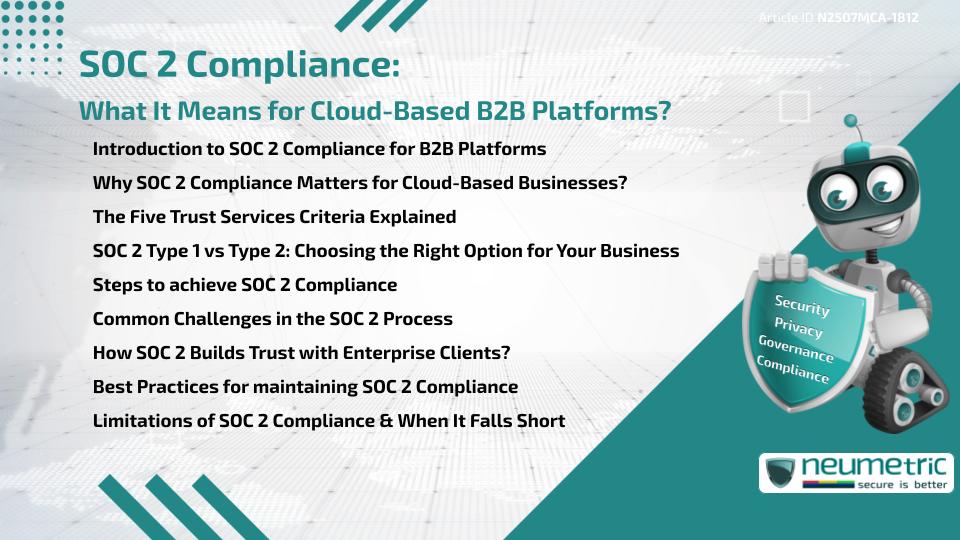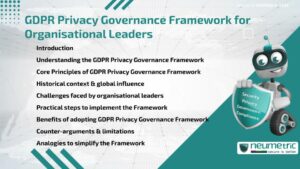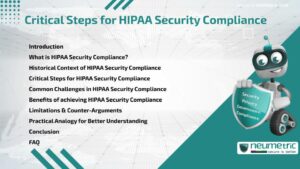Table of Contents
ToggleIntroduction to SOC 2 Compliance for B2B Platforms
In today’s digital economy, cloud-based B2B platforms are at the core of Business Operations. Whether it is data sharing, software delivery or Infrastructure-as-a-Service, these platforms handle vast amounts of sensitive Customer Data. As trust & security become non-negotiable in business transactions, SOC 2 Compliance stands as a benchmark of reliability.
Developed by the American Institute of Certified Public Accountants [AICPA], SOC 2 Compliance evaluates how well an Organisation protects Customer Data based on five Trust Services Criteria. This article breaks down its relevance, challenges, benefits & practical steps for B2B companies operating in cloud environments.
Why SOC 2 Compliance Matters for Cloud-Based Businesses?
The primary appeal of SOC 2 Compliance for B2B cloud platforms lies in its focus on Security, Availability & Confidentiality. Business clients want to know that their vendors follow standardised practices to safeguard Systems & Data. Without SOC 2 reports, platforms may find it harder to win enterprise contracts or pass vendor Risk Assessments.
Moreover, cloud services operate with Shared Responsibility Models, where customers & vendors both play a role in security. SOC 2 Compliance helps define & demonstrate a vendor’s accountability, closing the trust gap.
The Five Trust Services Criteria Explained
SOC 2 checkups are erected on five Trust Services Criteria:
- Security: Protection against unauthorised access & system breaches.
- Availability: Ensures systems are accessible & operational as promised.
- Processing Integrity: Validates that data is processed accurately & in a timely manner.
- Confidentiality: Assures Sensitive Data is restricted & encrypted.
- Privacy: Addresses how Personal Data is collected, stored & used.
Every Organisation pursuing SOC 2 Compliance tailors these principles to its services, depending on Client expectations & system Risks.
SOC 2 Type 1 vs Type 2: Choosing the Right Option for Your Business
Understanding the difference between the two types of SOC 2 reports is essential:
- Type 1: Assesses the design of controls at a specific moment in time.
- Type 2: Reviews how effective those controls are over a sustained period (usually three (3) to twelve (12) months).
Startups & early-stage B2B platforms often begin with Type 1 to show intent & readiness. Type 2, however, carries more weight during vendor reviews, particularly with large enterprises & regulated sectors.
Steps to achieve SOC 2 Compliance
Obtaining SOC 2 Compliance requires careful planning & the development of process maturity:
- Readiness Assessment: Understand control gaps & Risk areas.
- Control Design: Define Security Policies & procedures.
- Implementation: Roll out controls across systems, access & data flows.
- Monitoring: Use tools to observe control effectiveness.
- Audit: Engage a licensed CPA firm to conduct the Audit & issue the SOC 2 Report.
This timeline may span between three (3) & twelve (12) months depending on the Audit type & maturity of existing controls.
Common Challenges in the SOC 2 Process
Cloud-based platforms often encounter several challenges during the SOC 2 Compliance journey:
- Lack of Documentation: Policies & procedures must be clear & demonstrable.
- Tool Integration Gaps: Incomplete visibility across infrastructure tools can hinder monitoring.
- Staff Awareness: Employees must be trained to adhere to security protocols consistently.
- Change Management: Rapid product updates must not bypass control processes.
Anticipating these obstacles can streamline the process & reduce Audit friction.
How SOC 2 Builds Trust with Enterprise Clients?
SOC 2 Compliance is not just about internal hygiene—it is a business enabler. For B2B platforms, especially those selling to Fortune 500 companies or operating in regulated industries, a SOC 2 Report becomes part of the sales toolkit. It assures Procurement teams that Security, Availability & Confidentiality expectations are met.
This makes SOC 2 more than a checklist—it becomes a competitive advantage in high-trust industries like Finance, Healthcare or Legal Tech.
Best Practices for maintaining SOC 2 Compliance
SOC 2 Compliance is not a one-time activity. It requires ongoing effort & culture-building:
- Schedule regular internal audits.
- Automate Evidence Collection & logging.
- Revisit control objectives annually.
- Keep Employee Training current.
- Monitor Third Party vendors’ security postures.
Platforms using DevOps or Agile must also align rapid deployments with strong change control processes.
Limitations of SOC 2 Compliance & When It Falls Short
Despite its benefits, SOC 2 Compliance is not a universal solution. Here are some limitations:
- It does not prescribe specific tools or technologies.
- The audit process can be either a snapshot evaluation (Type 1) or a review over a set period (Type 2), rather than a continuous, real-time monitoring approach.
- It is not legally required, unlike HIPAA or GDPR for certain industries.
- It focuses on internal controls, not Customer-side Risks.
Organisations should pair SOC 2 with other standards like ISO 27001 or NIST CSF depending on business complexity.
Takeaways
- SOC 2 Compliance is particularly crucial for cloud-based B2B platforms that manage sensitive customer data.
- It enhances trust, supports enterprise sales & improves internal control maturity.
- Achieving & maintaining it requires policy alignment, documentation & Employee engagement.
- Limitations exist, but the benefits outweigh them for most cloud-first vendors.
FAQ
What is SOC 2 Compliance & why is it important?
SOC 2 Compliance is a Security Framework that evaluates how a company safeguards Customer Data based on five trust principles. It is vital for building enterprise trust.
How long does it take to get SOC 2 Compliance?
It typically takes between three (3) & twelve (12) months depending on the scope of Audit & organisational readiness.
Do startups need SOC 2 Compliance?
Yes, especially if they are targeting enterprise clients. Starting with a Type 1 report can demonstrate intent & preparedness.
Is SOC 2 Compliance mandatory?
It is not legally required, but many enterprises & partners expect it as part of vendor due diligence.
What is the cost of SOC 2 Compliance?
Costs vary, but for small to mid-sized platforms, it usually starts around INR four (4) lakh & can go higher depending on the Audit firm & readiness.
How often do you need to renew SOC 2 Compliance?
Type 2 audits are annual, so most Organisations conduct them every year to maintain trust & control integrity.
Can SOC 2 Compliance be automated?
Parts of the process such as Evidence Collection, access reviews & monitoring can be automated using Compliance platforms.
Need help?
Neumetric provides organisations the necessary help to achieve their Cybersecurity, Compliance, Governance, Privacy, Certifications & Pentesting goals.
Organisations & Businesses, specifically those which provide SaaS & AI Solutions, usually need a Cybersecurity Partner for meeting & maintaining the ongoing Security & Privacy needs & requirements of their Clients & Customers.
SOC 2, ISO 27001, ISO 42001, NIST, HIPAA, HECVAT, EU GDPR are some of the Frameworks that are served by Fusion – a centralised, automated, AI-enabled SaaS Solution created & managed by Neumetric.
Reach out to us!





